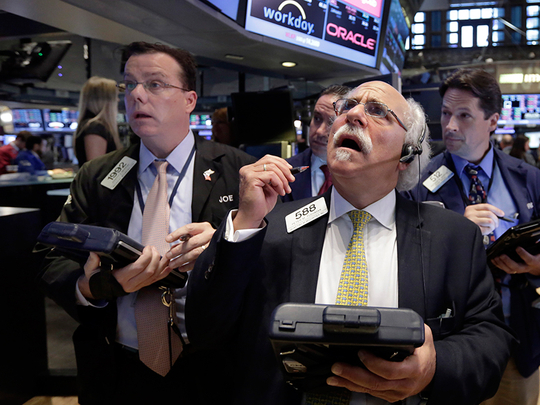
Dubai: If investors thought that the bloodbath witnessed in last week was a done deal, then think again.
According to Giles Keating, managing director, head of research and deputy chief investment officer at Credit Suisse, “after even Monday’s price action, we may still be some more falls, but value is improving especially in developed markets.”
Dow Jones Industrial Average fell more than 1,000 points at one point to hit a low of 15,370.33. The index last traded 4.24 per cent lower at 15,855.21. Stocks such as Goldman Sachs, Apple, and Nike were all down as much as 5 per cent.
Since last week the global markets have been on a roller coaster ride, with devaluation of yuan acting as the main trigger, and that spurred concerns about global growth. WTI crude, which traded below the keenly-watched $40 (Dh146.8) per barrel, also added to bearishness.
“I believe that the biggest angst amid traders is about the abate Chinese economic growth. The situation is becoming worse day by day and ostensibly the efforts by the PBOC are not working. Hopefully, this will be only a healthy correction, which we are experiencing, however, if this really turns out to be an equity market debacle, then it has a long way to go before we can see any meaningful opportunity,” said Naeem Aslam, chief market analyst at AVA Trade.
The Chinese government has so far allowed insurance companies to invest more assets in stocks and a programme to buy the shares of smaller companies.
But the state’s persistent efforts to boost the market has triggered an expectation from the investors to bail them out in problems.
Biggest risk
“It is normal for markets to see corrections when the Fed tightens, so current events are not so unusual,” said Keating.
But after the rate hikes, the markets gained in the last four times.
“Crucially, we believe that the developed economies remain robust and will continue to grow. Perhaps the biggest near term risk is if oil prices collapse further below 38, if they do that could trigger more general market weakness, but we think that’s unlikely,” Keating added.
Oil, on Monday, fell 4 per cent to fresh 6-1/2 year lows, taking the losses to more than 17 per cent below its opening price at the start of the month and Brent is down more than 16 per cent.
Rebalancing portfolio
Mark Haefele, Global Chief Investment Officer, UBS, advises investors to watch their portfolio and rebalance methodically back to their target weightings for equities and bonds.
“We will continue monitoring the situation for anything that would fundamentally hurt the case for equities and other risk assets. As things stand we remain comfortable holding equities in our portfolio for the long run,” Haefele added.
“Unless we see a further significant sell-off, which might make us re-evaluate, we would like to give the market time to calm down, and see some of the upcoming macro data confirm our growth thesis before adding meaningfully to risk-on exposure,” Haefele said.












